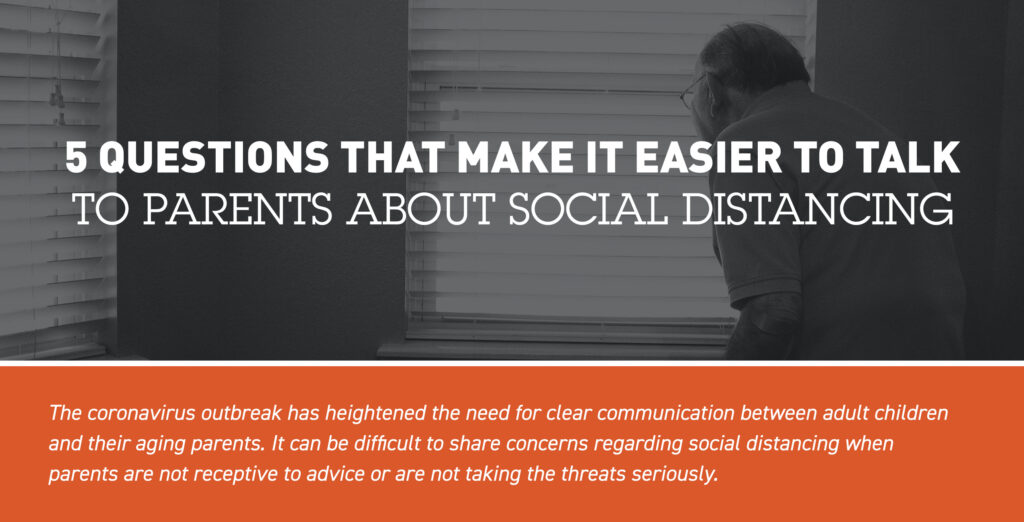According to the Centers for Disease Control (CDC), older adults, and those with underlying medical conditions, face a higher risk of contracting the COVID-19 virus. It’s important to know how to talk to your older parents about coronavirus, and to help them develop a plan to stay safe.
Learn how to talk to your senior parents about coronavirus.
No matter how old we get, our parents may still see us as “their kids” and be less receptive to our advice – this is especially true with baby boomers. Boomers are a generation that feels they have “been through it all” and pride themselves on their autonomy.
So, how can you talk with your senior loved one about the dangers of coronavirus and be taken seriously? More importantly, how can you empower them to change bad habits during this crisis?
1. Identify a trusted messenger to start the conversation.
You want the best for your parents, but they may still see you as a child and dismiss your concerns. Or worse, they may not take the risks seriously because they don’t want to worry you.
- Reach out to one of their peers. That person could be their church leader, a sibling, or a dear family friend. Your parents may have an easier time taking advice when the message is delivered by someone they perceive as a peer.
- Share your concerns. Have a frank conversation with the messenger and develop a plan to help your loved one understand the risks they are facing.
- Be willing to listen. This person may have a deeper understanding of the concerns your parents are facing. Listen to their perspective and consider their feedback in approaching the conversation with your loved ones.
2. Make sure the facts you share are verified.
Information about COVID-19 has flooded social media and the internet, and not all of it is accurate.
- Check your sources. A good rule of thumb, is to rely on verified medical resources like the CDC and the National Foundation for Infectious Diseases to provide important tips, such as how to protect yourself and others from the virus.
- Look to the experts. At Marquis, we understand the importance of staying informed and have launched a special resource page to keep you connected with up-to-date resources and our response to the COVID-19 pandemic.
3. Ask pointed questions.
Asking your parents pointed questions in a non-threatening way is a good way to involve them in the conversation without putting them on the defensive.
- What do they think of the COVID-19 situation? Ask them their opinion. You may unearth some hidden concerns that can be addressed in their care plan.
- Have they taken any steps to prepare? You may find your loved ones are more prepared than you realized. This could be an opportunity to help them take stock of their resources.
- Do they have a plan if they fall ill? Find out who their important contacts are, for medical purposes and other support you or they may need. For example, a local friend that can keep an eye on their house or pet.
4. Be mindful of your tone.
No one wants to be spoken to in a condescending manner. Be sure that you are actively listening to your aging parents’ concerns and empowering them to build a care plan.
- They might not be ready to listen. You have to be prepared for the fact that your loved ones might not be open to planning. Relentlessly pursuing the subject may lead to them avoiding the topic all together.
- Give them space. If your parents pull away and won’t listen, don’t give up. Be patient and wait for them to process the information that has been shared with them.
- Lead from a place of love. Make sure that your parents understand that you are coming from a place of love and concern for them, not of control.
Marquis, a Family-Owned Company Passionate About Senior Living & Care
The Marquis team knows how difficult these kinds of conversations can be. As industry leaders with over 30 years of experience working with seniors, we’ve developed some excellent tools to help you navigate difficult conversations about care.
